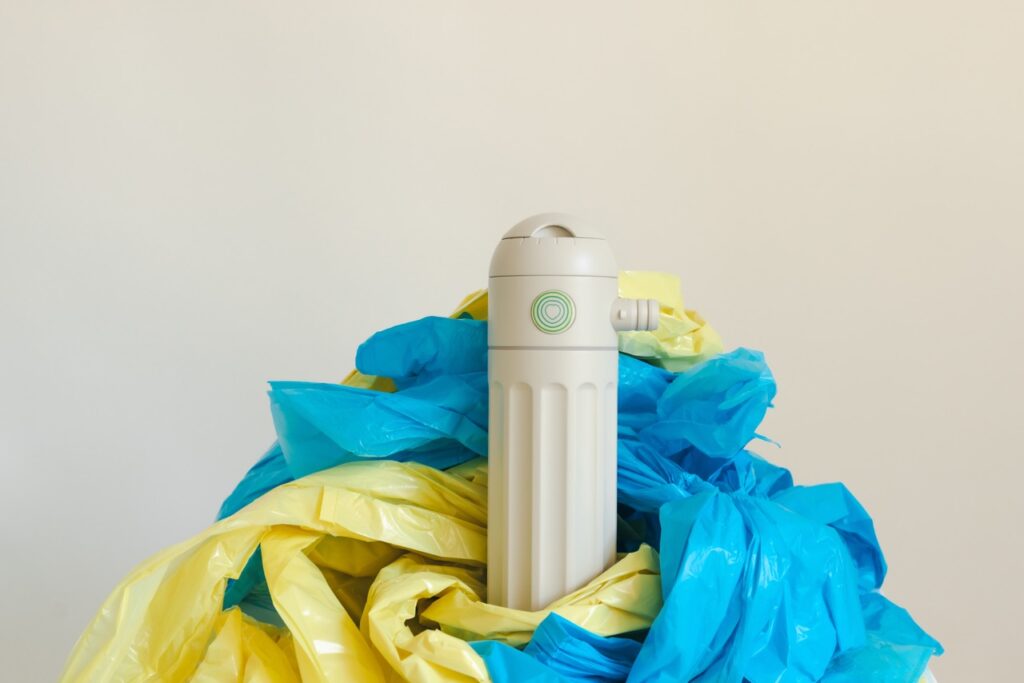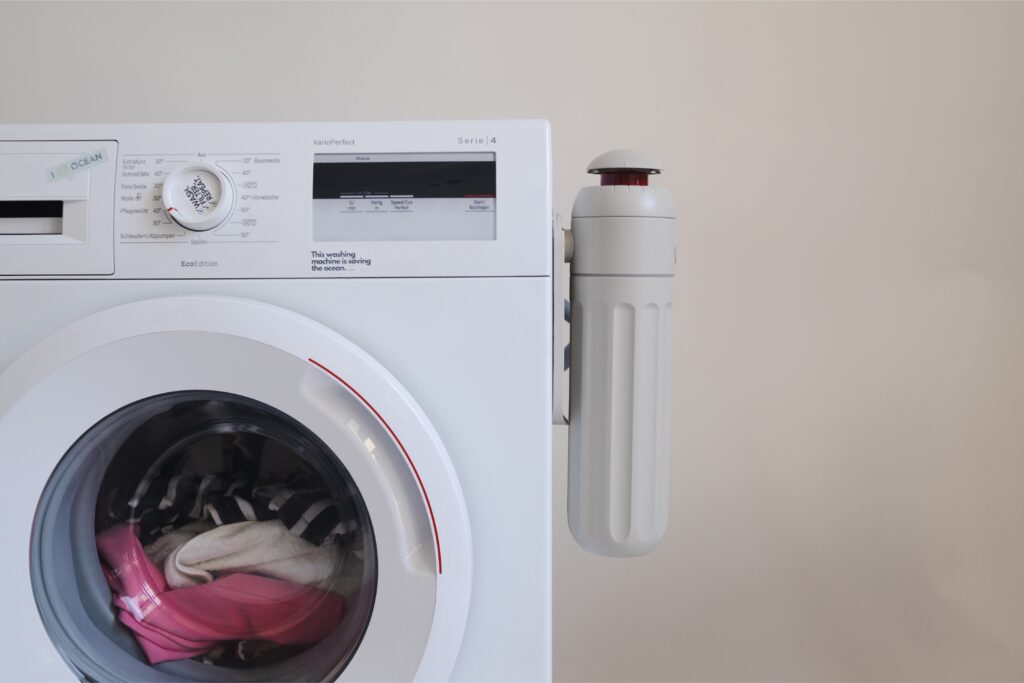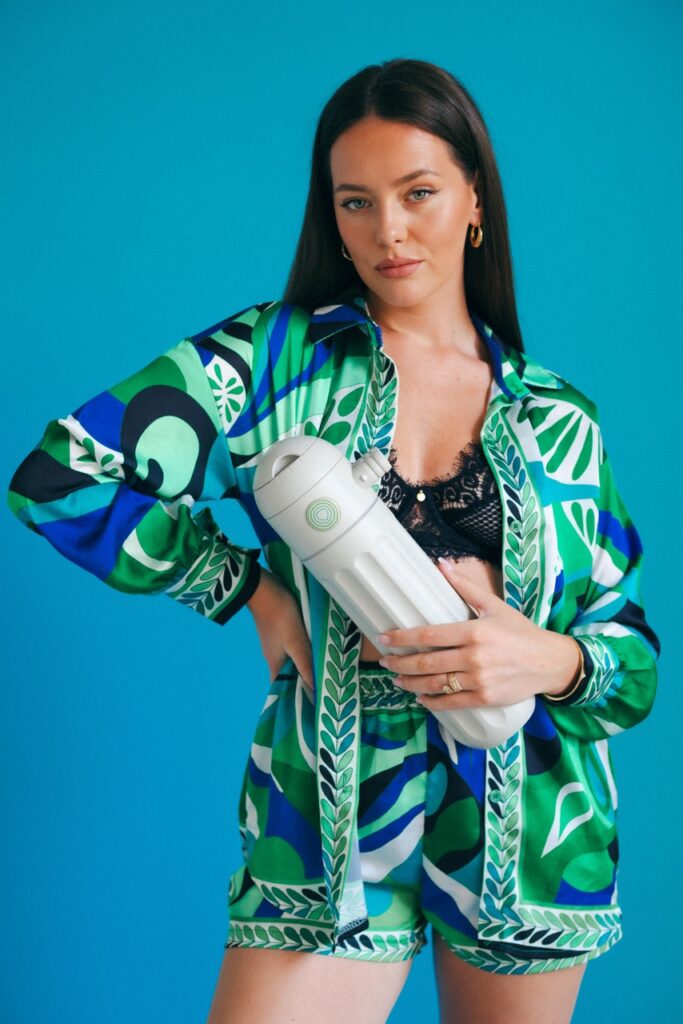This Washing Machine Filter Captures 98% of the Microplastics Released from Your Laundry
5 Mins Read
Slovenian startup PlanetCare has launched the second iteration of its microfibre-absorbing laundry filter, which can capture 98% of all pollutants from washing machine wastewater. Now made from recycled plastic, its cartridges are reusable, and – unlike many other filters – don’t require power.
Microplastics are a big problem. There are 14 million tonnes of microplastics on the ocean floor and 24 trillion pieces of microplastic on the ocean surface. These tiny grains of plastic are omnipresent, affecting the survival, growth and fertility of aquatic life, and also entering humans’ food system.
Scientists have discovered the presence of these particles in the human body, and according to one study, we eat 5g of microplastics per week on average – that’s equivalent to eating a credit card’s worth of plastic. Microplastics are found in takeaway coffee cups, homeware and furniture, the rain, and even children (97% of them).
Our laundry isn’t great for the environment

But the biggest source of microplastics is our laundry – research has found that 35% of microplastic pollution in oceans comes from our washing machines. The turbulence and friction from washing our clothes in these appliances release microfibers, a subset of microplastics. Synthetic fibres including polyester, nylon and acrylic – all made from plastic – make up 60% of all our clothes. And in a typical wash, 700,000 of these tiny microplastic fibres can be released into the drainage system.
Another estimate has found that every 5kg load of laundry leads to between 600,000 and 17 million microplastic fibres leaching into our waterways and the environment. And it’s not just our clothes that are the issue – the detergent we use also matters. One study shows that 75% of the plastic used in laundry pods enters the environment, and separate research has found microplastics in 119 popular detergents.
Last month, a white paper directed towards the EU argued that washing machine filters are the only effective solution to reducing microfibres in the atmosphere, at least in the short term, urging the bloc to make them mandatory. It was co-written by A Plastic Planet and 5 Gyres Institute, as well as laundry filter brands Matter, Xeros Technology and PlanetCare.
PlanetCare’s microfibre filter 2.0

It’s the latter company that has come out with a new, improved product to deal with this microplastic mess. PlanetCare, which was founded in 2017, has launched the second version of its microfibre filter for washing machines. Dušan Matičič, the company’s chief marketing officer, told Green Queen that the new filter works with all washing machines and is only connected to the drain hose. (PlanetCare provides adapters if the diameters for the hose are different.)
Not only do you not need to replace your washing machine, the new filter doesn’t require any electricity or plugging in and hence needs no batteries. PlanetCare – which is co-funded by the EU through its European Innovation Council Accelerator grant – uses a unique patent-pending multilayer depth filter and claims it is the only company whose product can catch fibres down to 10 microns in length. It adds that the filter can absorb 98% of microfibres, “capturing more microplastics than any competitor”.
The new filter also has a bypass option. “You can switch off filtering when you’re washing cotton, wool and other natural garments. This makes the filter cartridge last much longer,” explains Matičič. There’s also automatic clog detection, which is activated when the cartridge is full during a wash cycle. “No more counting washes and no more changing cartridges during a wash cycle,” he notes.
The flow adjustment mechanism helps the filter fit all washing machine water pumps, which is especially helpful in the US where some “have very powerful water pumps”. And in terms of the build, it features a ridged design for easy opening and closing – plus, the whole thing is now made from recycled plastic, “because it makes sense”. The installation is also easier, “with intuitive connections and extra-strong washing machine connection”. And like the first iteration of PlanetCare’s washing machine filter, you still don’t need any screws to install it.
Circularity, reducing waste and championing reuse

Circularity and low-waste are a big part of the new product’s ethos. “The new filter is fully compatible with old cartridges because we are aware that many existing users have a stock of cartridges at home. So when you switch to the new filter, the old cartridges can still be used,” explains Matičič.
The filter is “more efficient than ever”, allowing for at least 30 washes before the cartridge needs to be changed. And when that time does come, users can return the cartridges via a prepaid courier service. Once delivered back to PlanetCare, 95% of each cartridge is cleaned, refitted with a new filter mesh, and sent back to customers for reuse, while the remaining 5% (largely fibres caught in the mesh) is recycled. This forms a “true closed loop” system, making its solution entirely circular, the company says.
Moreover, the cartridge itself is “lighter, softer [and] longer-lasting”, and has less packaging volume to lower the impact of return shipping. It also requires fewer materials to make. PlanetCare is trialling a partnership with fellow Slovenian brand Donar, a furniture manufacturer. Donar is working on an Ocean microplastics line of products from the fibres caught in PlanetCare’s filters.
The new product retails for the same price as the first version and is available worldwide, and Matičič confirmed that it will be available at retailers next year. PlanetCare isn’t the only company that makes microfibre filters for washing machines – Arcelik, Gulp and Filtrol have their own versions.
According to the Guardian, studies have varied in their assessment of such filters’ efficacy, which has ranged from 29% to 74%. But solutions like fabric technology innovations to prevent shedding, or catching them at wastewater treatment plants (which release about 80% of all wastewater without treating it) are “not immediately viable”, making washing machine microfibre filters a good solution for the current market.
You do need some space around your laundry machine to attach PlanetCare’s filter – but if you have it, it’s probably a good idea to install microplastic-capturing tools like this, both for your health and the planet’s.




